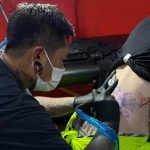New federal COVID-19 safety rules exempt most employers
The Biden administration has exempted most employers from long-awaited rules for protecting workers from the coronavirus, angering labor advocates who had spent more than a year...
The Biden administration has exempted most employers from long-awaited rules for protecting workers from the coronavirus, angering labor advocates who had spent more than a year...
South Africa has been gripped by the mystery of whether a woman has, as has been claimed, actually given birth to 10 babies, in what would...
G7 leaders will agree to expand global COVID vaccine manufacturing to provide at least one billion doses to the world through sharing and financing schemes, Britain...
Have you ever been cut off in traffic by another driver, leaving you still seething miles later? Or been interrupted by a colleague in a meeting,...
Oncotarget published “The presence of polymorphisms in genes controlling neurotransmitter metabolism and disease prognosis in patients with prostate cancer: a possible link with schizophrenia” reported that...
Great uncertainty surrounds the origins of SARS-CoV-2. Early on, some suggested a link between COVID-19 and a seafood market in Wuhan, China. Other theories are now...
A new study published in Diabetologia reveals that having a normal metabolic profile does not mean that a person with obesity is actually healthy (referred to...
Researchers have studied human kidney cells in the lab to examine the effects of COVID-19 on kidney health. The findings appear in an upcoming issue of...
A new Cleveland Clinic-led study has identified mechanisms by which COVID-19 can lead to Alzheimer’s disease-like dementia. The findings, published in Alzheimer’s Research & Therapy, indicate...
Researchers remain perplexed as to what causes dementia and how to treat and reverse the cognitive decline seen in patients. In a first-of-its-kind study, researchers at...








